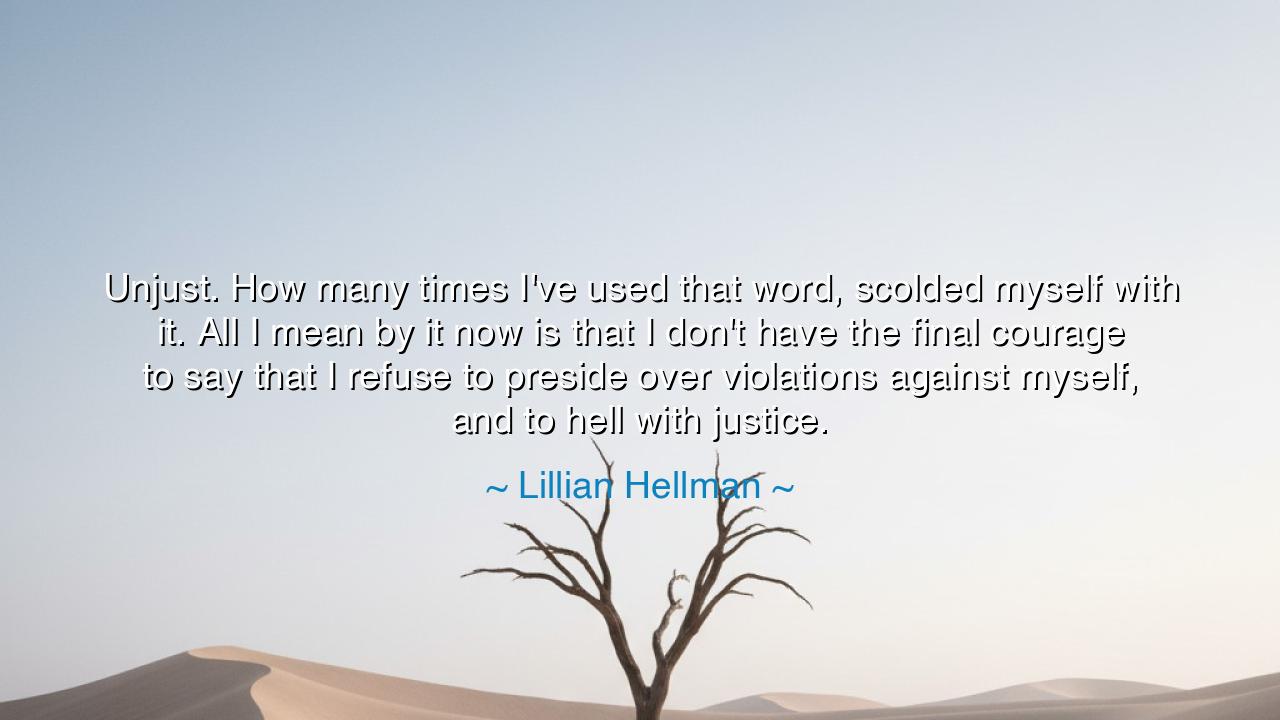
Unjust. How many times I've used that word, scolded myself with
Unjust. How many times I've used that word, scolded myself with it. All I mean by it now is that I don't have the final courage to say that I refuse to preside over violations against myself, and to hell with justice.






When Lillian Hellman, the fierce and unyielding voice of American letters, wrote, “Unjust. How many times I've used that word, scolded myself with it. All I mean by it now is that I don't have the final courage to say that I refuse to preside over violations against myself, and to hell with justice,” she was not speaking as a philosopher lost in abstraction, but as a woman who had stared directly into the face of moral cowardice — her own and that of the world. Her words are raw, trembling with honesty, for they expose one of humanity’s deepest wounds: that we cry for justice, yet often lack the courage to demand it for ourselves. To declare something “unjust” is easy; to stand up and end it — that is the act that separates the timid from the free.
Hellman’s life, marked by political storms and acts of defiance, gave birth to this truth. She lived through an age when to speak one’s conscience could mean exile, humiliation, or ruin. During the dark era of the McCarthy hearings, when the shadow of fear fell across America, she was summoned to name others, to betray friends in exchange for her own safety. She refused. In her famous letter to the committee, she wrote, “I cannot and will not cut my conscience to fit this year's fashions.” Yet even this act of courage came with pain, for she understood how easily the word “justice” can become a cloak for fear — a noble-sounding word that hides our reluctance to defend our own dignity.
In this quote, Hellman turns her anger inward. She admits that she has used “unjust” as a shield, a way of lamenting what she would not resist. How often, she asks, do we scold the world for its wrongs yet still tolerate our own suffering, pretending virtue while quietly submitting to violation? Her words are an act of confession — and rebellion. When she says, “to hell with justice,” she does not reject the ideal of fairness; she rejects the empty rhetoric of those who speak of justice but lack the courage to act. For her, real justice begins the moment one refuses to be complicit in one’s own diminishment.
This is a cry heard throughout history. Think of Joan of Arc, the peasant girl who stood before her judges — the powerful men who sought to silence her — and refused to betray the truth she carried. She, too, might have called her treatment “unjust,” but instead she faced her accusers and said, “I was born for this.” Like Hellman, she understood that the purest form of justice is self-respect — the refusal to surrender the sacred authority of one’s own soul. Justice, stripped of courage, is merely complaint. But courage, even without justice, is the beginning of liberation.
Hellman’s words also uncover a profound paradox: that the fear of defiance often disguises itself as moral reasoning. We tell ourselves that endurance is noble, that patience is wise, that forgiveness is divine — and sometimes it is. But often these are the polite names we give to our inability to confront abuse. We say, “It’s unjust,” as though speaking the word were an act of bravery, when in truth it is a whisper that hides our trembling. Hellman exposes this deceit within herself and within all of us. Her confession is a mirror: How many times have we called something unfair, only to continue permitting it?
There is, too, a sacred violence in her conclusion — “to hell with justice.” It is the cry of a soul weary of waiting for moral order to descend from the heavens. She declares that justice must not be begged for — it must be claimed. The world, she implies, is too slow, too compromised, to deliver fairness to those who do not demand it. Thus, the final courage she speaks of is not rage against others, but refusal to preside over one’s own diminishment — to no longer act as the silent judge approving one’s own suffering. This is the point where endurance ends and self-respect begins.
So, my listener, take heed of this hard wisdom. When you are wronged, do not merely name the wrong. When you are violated — by cruelty, by indifference, by your own silence — do not simply say, “It is unjust.” Ask instead, “Why do I remain where I am wounded?” For there comes a time when to seek justice is not enough — one must embody it. The world may never right its scales, but you can refuse to weigh yourself down with submission. Courage is the highest form of justice, for it restores to you the power that injustice seeks to steal.
And if one day you find yourself trembling before the choice — to endure or to defy — remember Lillian Hellman’s burning words. Do not wait for the world’s permission to protect your dignity. Do not wait for justice to be granted by those who profit from your silence. Stand up, even if your voice shakes, and say: “I refuse to preside over violations against myself.” For in that moment, justice and courage become one — and freedom begins.






AAdministratorAdministrator
Welcome, honored guests. Please leave a comment, we will respond soon